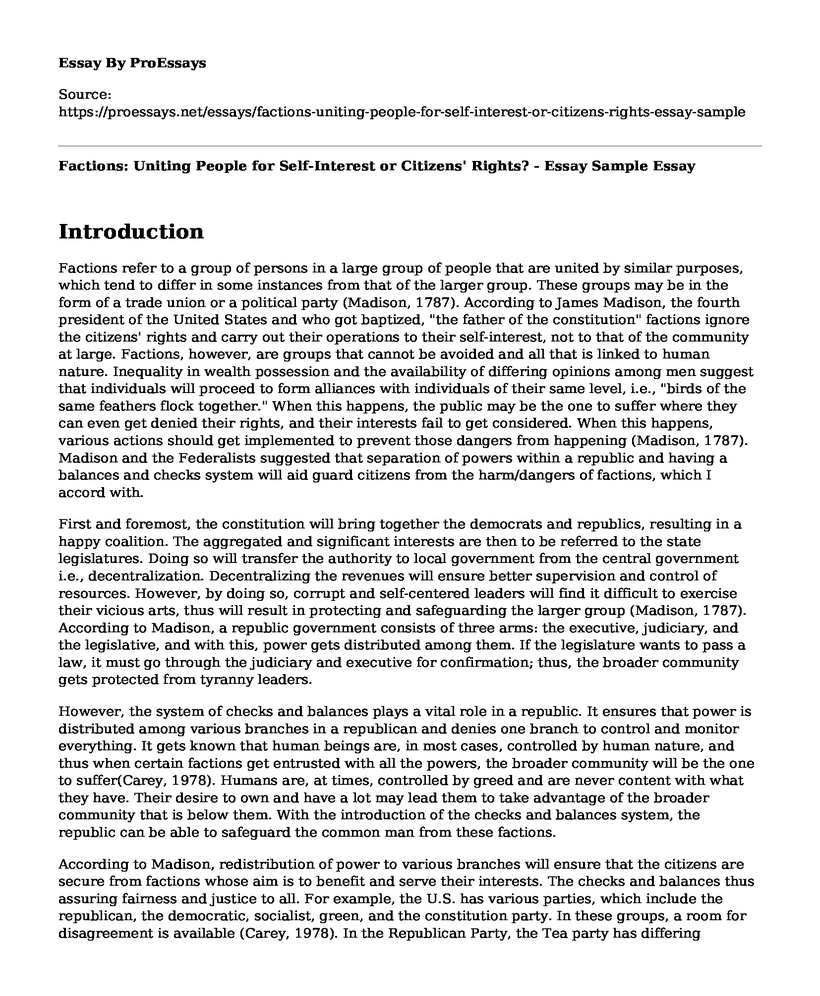Introduction
Factions refer to a group of persons in a large group of people that are united by similar purposes, which tend to differ in some instances from that of the larger group. These groups may be in the form of a trade union or a political party (Madison, 1787). According to James Madison, the fourth president of the United States and who got baptized, "the father of the constitution" factions ignore the citizens' rights and carry out their operations to their self-interest, not to that of the community at large. Factions, however, are groups that cannot be avoided and all that is linked to human nature. Inequality in wealth possession and the availability of differing opinions among men suggest that individuals will proceed to form alliances with individuals of their same level, i.e., "birds of the same feathers flock together." When this happens, the public may be the one to suffer where they can even get denied their rights, and their interests fail to get considered. When this happens, various actions should get implemented to prevent those dangers from happening (Madison, 1787). Madison and the Federalists suggested that separation of powers within a republic and having a balances and checks system will aid guard citizens from the harm/dangers of factions, which I accord with.
First and foremost, the constitution will bring together the democrats and republics, resulting in a happy coalition. The aggregated and significant interests are then to be referred to the state legislatures. Doing so will transfer the authority to local government from the central government i.e., decentralization. Decentralizing the revenues will ensure better supervision and control of resources. However, by doing so, corrupt and self-centered leaders will find it difficult to exercise their vicious arts, thus will result in protecting and safeguarding the larger group (Madison, 1787). According to Madison, a republic government consists of three arms: the executive, judiciary, and the legislative, and with this, power gets distributed among them. If the legislature wants to pass a law, it must go through the judiciary and executive for confirmation; thus, the broader community gets protected from tyranny leaders.
However, the system of checks and balances plays a vital role in a republic. It ensures that power is distributed among various branches in a republican and denies one branch to control and monitor everything. It gets known that human beings are, in most cases, controlled by human nature, and thus when certain factions get entrusted with all the powers, the broader community will be the one to suffer(Carey, 1978). Humans are, at times, controlled by greed and are never content with what they have. Their desire to own and have a lot may lead them to take advantage of the broader community that is below them. With the introduction of the checks and balances system, the republic can be able to safeguard the common man from these factions.
According to Madison, redistribution of power to various branches will ensure that the citizens are secure from factions whose aim is to benefit and serve their interests. The checks and balances thus assuring fairness and justice to all. For example, the U.S. has various parties, which include the republican, the democratic, socialist, green, and the constitution party. In these groups, a room for disagreement is available (Carey, 1978). In the Republican Party, the Tea party has differing opinions than the majority republicans. It poses a danger to Americans since the Tea party can join hands with those who have similar ideas as them and try to act everything on their favor without considering the citizen's interests. Direct democracy poses a significant danger to U.S. citizens since it is an invite of mob rule, and in this, the larger group gets to control the minor group (Carey, 1978). According to Madison, a republic government is his recommendation since people can elect a leader of their choice, and decisions will get based on the constitution, not specific individuals.
Conclusion
In conclusion, factions are a group of individuals who only think about their well-being and how they can benefit their selves without considering the ones who get affected. A republican government where there is redistribution of powers and use of checks and balances system is thus preferred since it takes into account every citizen. Decentralizing of revenues protects the citizen from tyranny people by ensuring high supervision and control of resources.
References
Carey, G. W. (1978). Separation of Powers and the Madisonian Model: A Reply to the Critics. American Political Science Review, 72(1), 151-164. Retrieved from https://www.cambridge.org/core/journals/american-political-science-review/article/separation-of-powers-and-the-madisonian-model-a-reply-to-the-critics/D85908649B30FBEDE15E58F676B7FAFD
Madison, J. (1787). The federalist no. 10. November 22(1787), 1787-88. Retrieved from https://www.sfponline.org/Uploads/267/federalist%2010.pdf
Cite this page
Factions: Uniting People for Self-Interest or Citizens' Rights? - Essay Sample. (2023, Mar 30). Retrieved from https://proessays.net/essays/factions-uniting-people-for-self-interest-or-citizens-rights-essay-sample
If you are the original author of this essay and no longer wish to have it published on the ProEssays website, please click below to request its removal:
- Essay Sample on Building a Multi-Racial Society
- Literary Analysis Essay on How the Other Half Lives
- Essay Sample on Latino Women as Victims of Domestic Violence
- Mexico's War on Drugs: Violation of Women's Human Rights - Essay Sample
- Essay Example on Human Trafficking: Exploitation Across Racial, Geographic Lines
- Paper Sample on Modern Slavery: Human Trafficking and its Global Impact
- Free Report Sample on Evaluating Fairness in the Workplace







